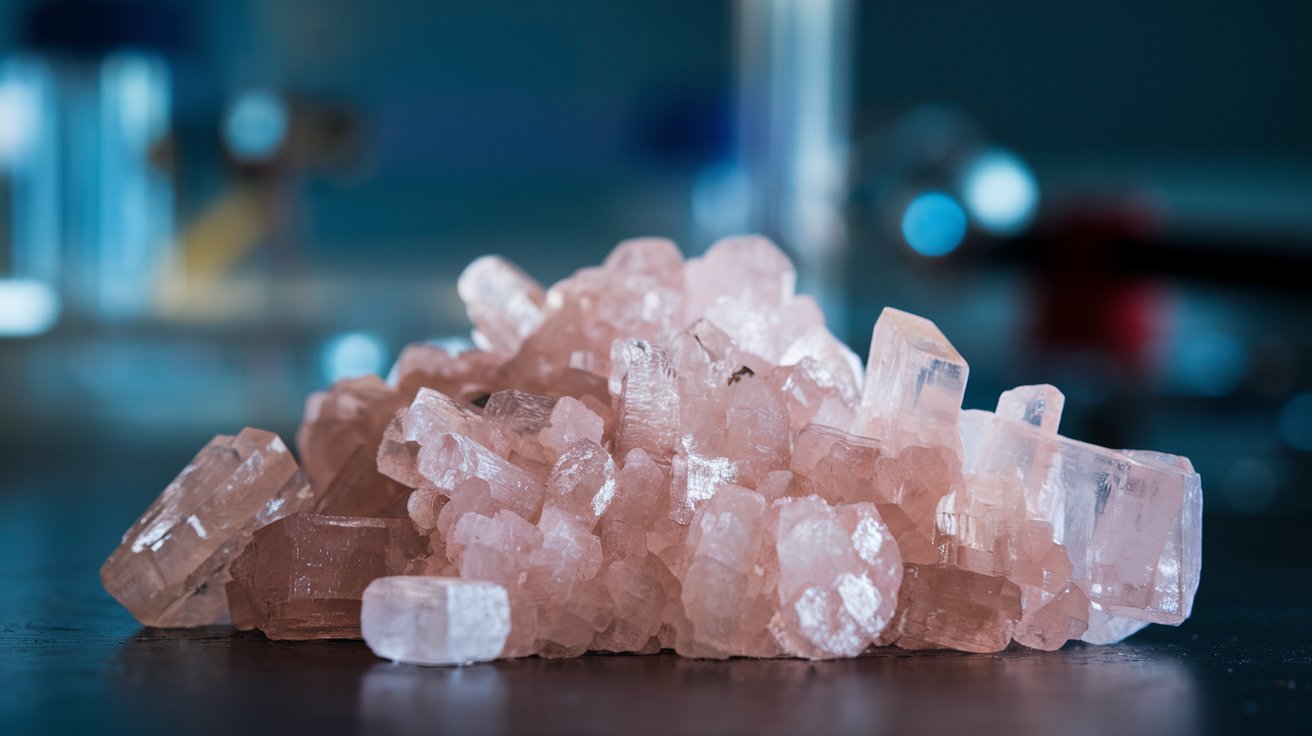
Aluminium Potassium Sulfate, commonly known as potassium alum, is a fascinating compound with a wide range of uses. Ever wondered why your deodorant works so well? Potassium alum might be the secret ingredient. This versatile substance is not only found in personal care products but also in food, water purification, and even in your garden. Historically, it played a crucial role in dyeing fabrics and tanning leather. Its crystal-clear structure makes it a favorite for science experiments and educational demonstrations. Curious about its chemical properties or how it’s made? Stick around to uncover 30 intriguing facts about this multifaceted compound.
Key Takeaways:
- Aluminium Potassium Sulfate, or potassium alum, has a rich history and diverse uses, from ancient mummification to modern-day deodorants and water purification. Its unique properties make it a valuable substance in various industries.
- Potassium alum's versatility extends to scientific, environmental, and even fun applications, such as crystal growing kits and educational demonstrations. While it has positive impacts, efforts are underway to make its production and use more sustainable.
What is Aluminium Potassium Sulfate?
Aluminium Potassium Sulfate, also known as potassium alum, is a chemical compound with a variety of uses. It’s a double sulfate of aluminium and potassium, often found in its dodecahydrate form. Here are some fascinating facts about this versatile substance.
-
Chemical Formula: The chemical formula for aluminium potassium sulfate is KAl(SO4)2·12H2O. This indicates it contains potassium, aluminium, sulfate ions, and water molecules.
-
Natural Occurrence: Potassium alum occurs naturally as the mineral alunite. This mineral can be found in volcanic rocks and is mined in several parts of the world.
-
Historical Use: Ancient civilizations used potassium alum for various purposes. Egyptians used it in the mummification process, while Greeks and Romans used it for dyeing fabrics.
-
Astringent Properties: Potassium alum has astringent properties, meaning it can contract body tissues and reduce bleeding. This makes it useful in aftershave products and styptic pencils.
-
Water Purification: One of the most common uses of potassium alum is in water purification. It helps coagulate impurities, making them easier to filter out.
Uses in Everyday Life
Potassium alum is not just a chemical curiosity; it has practical applications in everyday life. Here are some of the ways it’s used.
-
Deodorant: Many natural deodorants contain potassium alum because it inhibits the growth of bacteria that cause body odor.
-
Pickling: In the culinary world, potassium alum is used in pickling to maintain the crispness of vegetables.
-
Baking Powder: It’s a component of some baking powders, where it acts as an acid that reacts with baking soda to produce carbon dioxide gas, helping dough rise.
-
Fire Extinguishers: Some fire extinguishers use potassium alum as a flame retardant.
-
Leather Tanning: The leather industry uses potassium alum in the tanning process to make leather more durable and less prone to rotting.
Scientific and Industrial Applications
Beyond household uses, potassium alum plays a significant role in various scientific and industrial fields.
-
Paper Manufacturing: It’s used in the paper industry to improve the quality of paper by making it more resistant to water and ink.
-
Textile Industry: Potassium alum is used as a mordant in dyeing fabrics, helping dyes adhere better to the material.
-
Photography: In traditional photography, potassium alum was used in the fixing process to make images more permanent.
-
Gardening: Gardeners use potassium alum to adjust soil pH levels, making it more acidic for plants that thrive in such conditions.
-
Medicine: In medicine, potassium alum is used in vaccines as an adjuvant to enhance the body’s immune response.
Interesting Chemical Properties
The chemical properties of potassium alum make it a subject of interest for chemists and researchers.
-
Solubility: Potassium alum is highly soluble in water, making it easy to use in various aqueous solutions.
-
Crystallization: It forms large, transparent crystals that are often used in educational settings to teach about crystal growth.
-
Melting Point: The melting point of potassium alum is relatively low, around 92°C (198°F), which is useful in certain industrial processes.
-
pH Level: It has a slightly acidic pH when dissolved in water, which can be useful in various chemical reactions.
-
Non-Toxic: Potassium alum is generally considered non-toxic and safe for use in food and personal care products.
Environmental Impact
Potassium alum also has implications for the environment, both positive and negative.
-
Biodegradability: It is biodegradable, meaning it breaks down naturally without causing long-term harm to the environment.
-
Water Treatment: Its use in water treatment helps reduce pollutants and improve water quality, benefiting ecosystems.
-
Mining Impact: The extraction of alunite for potassium alum can have environmental impacts, including habitat disruption and pollution.
-
Recycling: Potassium alum can be recycled from industrial waste, reducing the need for new mining operations.
-
Sustainable Practices: Efforts are being made to develop more sustainable methods for producing and using potassium alum.
Fun and Unusual Facts
Here are some quirky and lesser-known facts about potassium alum that might surprise you.
-
Crystal Growing Kits: Potassium alum is often included in crystal growing kits for kids, making science fun and educational.
-
Historical Texts: References to potassium alum can be found in ancient texts, including works by Pliny the Elder and Dioscorides.
-
Cosmetic Use: In addition to deodorants, potassium alum is used in some cosmetic products to tighten skin and reduce wrinkles.
-
Cultural Significance: In some cultures, potassium alum is used in traditional medicine and rituals.
-
Educational Demonstrations: Teachers use potassium alum in classrooms to demonstrate chemical reactions and properties, making it a valuable educational tool.
The Final Word on Aluminium Potassium Sulfate
Aluminium potassium sulfate, often called potash alum, is a fascinating compound with a rich history and diverse uses. From its role in water purification to its presence in baking powder, this mineral has proven invaluable. Its ability to form beautiful crystals makes it a favorite in educational science experiments. Historically, it played a crucial part in dyeing fabrics and tanning leather.
Understanding its properties and applications helps appreciate its significance in daily life. Whether you're a student, a hobbyist, or someone curious about chemistry, knowing these facts about aluminium potassium sulfate can be quite enlightening.
So next time you encounter this compound, you'll have a deeper appreciation for its versatility and importance. Keep exploring and learning about the wonders of chemistry!
Frequently Asked Questions
Was this page helpful?
Our commitment to delivering trustworthy and engaging content is at the heart of what we do. Each fact on our site is contributed by real users like you, bringing a wealth of diverse insights and information. To ensure the highest standards of accuracy and reliability, our dedicated editors meticulously review each submission. This process guarantees that the facts we share are not only fascinating but also credible. Trust in our commitment to quality and authenticity as you explore and learn with us.


